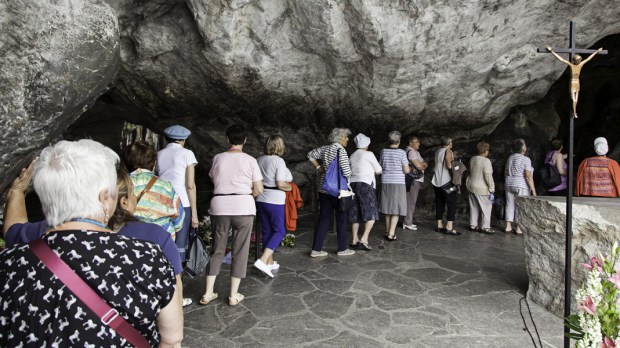One spiritual devotion that spans all major religions is the action of going on pilgrimage. It is an ancient concept, one that appears to correspond with a basic desire in the human heart.
The practice of embarking on a journey to seek spiritual aid at a particular shrine goes back thousands of years. The Greeks went to Delphi, Peruvians to Cuzco, Buddhists to Kapilavastu, Muslims to Mecca and Jews to Jerusalem. Wherever a miraculous event occurred or a deity was located, people flocked to it in order to perform some sort of religious activity.
Naturally, this type of spiritual expression found a fitting place in Christianity. From the very beginning Christians were drawn to locations where heaven met earth, with the Holy Land being the primary place of pilgrimage.
Early on Christians not only visited those places where Jesus walked, but also the cities, tombs and churches of the saints and martyrs. They wanted to be at the exact spot where St. Peter was executed in Rome, or the place where the body of St. James was miraculously transported. It allowed them to draw closer to these heroes of the faith and to ratify their existence.
Yet, there is more to pilgrimage than simply visiting the places of these historical events and people. Pope Benedict XVI explained the spiritual dimension of pilgrimage when visiting Santiago de Compostela.
To go on pilgrimage is not simply to visit a place to admire its treasures of nature, art or history. To go on pilgrimage really means to step out of ourselves in order to encounter God where he has revealed himself, where his grace has shone with particular splendour and produced rich fruits of conversion and holiness among those who believe.
The Catechism of the Catholic Church adds another dimension as well, reminding us that going on pilgrimage is a summary of our earthly lives.
Pilgrimages evoke our earthly journey toward heaven and are traditionally very special occasions for renewal in prayer. For pilgrims seeking living water, shrines are special places for living the forms of Christian prayer “in Church.” (CCC 2691)
It is a basic belief of the Christian faith that humans are “pilgrims” or “exiles” on the earth. This is expressed in the word “parish,” a word used to denote a local Catholic congregation. It is derived from the Greek paroikos, meaning “a sojourner.” This word is used in the Acts of the Apostles where Stephen speaks about the history of the Jewish people, explaining how they were “aliens in a land not their own” (Acts 7:6). In this way a parishioner is truly a “sojourner,” a pilgrim journeying towards his/her heavenly homeland.

Read more:
What is a parish?
Going on pilgrimage, then, is an important aspect of the spiritual life. The pilgrimage could be something as difficult as going to the Holy Land, or as simple as visiting the local parish church or shrine. Whatever type of pilgrimage it is, the action corresponds to a desire in our hearts to arrive at a place of light, refreshment and peace. It speaks to that interior desire that God placed within each one of us and reminds us that we should live our daily lives understanding that this world is not our home, but a preparation for our eternal home of Heaven.

Read more:
Walk along Ireland’s own “Camino” pilgrimage route

Read more:
How the scallop shell became a symbol of pilgrimage

